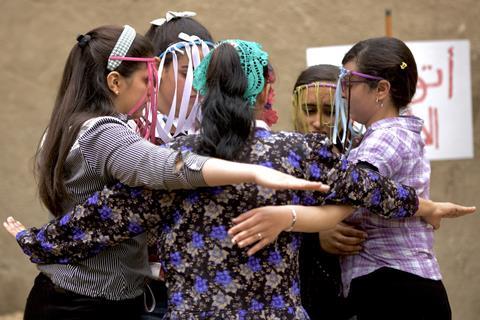An all-female Egyptian street theatre troupe act out their frustrations in this appealing Critics Week documentary

Dirs/scr: Ayman El Amir, Nada Riyadh. Egypt/France/Denmark/Qatar/Saudi Arabia. 2024. 102mins
How do you plan a future that is not in your control? The Brink Of Dreams follows an all-female street theatre troupe in southern Egypt as their hopes and aspirations confront the cold dawning of reality. Observing the women over a four-year period, directors Ayman El Amir and Nada Riyadh capture a poignant coming-of-age documentary that finds bigger truths in individual experiences. This engaging, sobering human story should find a welcome at documentary festivals, specialist channels and beyond.
Offers a window into an often unseen world
The Brink Of Dreams embeds us in the life of a small, conservative Egyptian village. Riyadh and El Amir present a vivid portrait of dusty brick houses, fly-blown streets where goats and livestock meander, tangerine dawns and starry night skies. People go about lives that seems unchanging; women cook, clean and serve, children hang around on street corners in search of distraction. Homes feel cluttered and confining, the streets open up to create a space for performance and discourse.
Majda Massoud is a guiding voice in the Panorama Barshe Troupe, leading a small group of young women as they rehearse and perform short pieces that confront the obstacles preventing them achieving their dreams. They dance, sing and issue provocative challenges to their audience, asking why a girl cannot marry the boy she loves or why dresses are considered immoral. The public performances are met with a mixture of curiosity, amusement and stark hostility. “If that was my daughter, I’d set her on fire,” declares one onlooker.
We spend time eavesdropping on the lives of these women, watching the slow shift from their idealism to a more melancholy reckoning with the limitations placed upon them. Majda’s dream is to head to Cairo and study drama. Monika Youssef believes that her singing could carry her to a professional career. Haidi Sameh fends off marriage proposals while trying to figure out what she wants. The world they face is revealed in random conversations. Majda’s brother, for example, tells her there is no point in wasting her time on education as her destiny is to be a housewife and mother.
In this way, the film gently draws us into the lives of young women at the mercy of men who always seem to know what is best for them. Haidi’s caring, progressive father seems the exception. The quiet flow of a local river and the sway of palm trees create a deceptive sense of tranquility in sharp contrast to the frustrations generated by what happens as the girls grow older. Even men who seem decent become much more traditionalist and controlling once marriage vows have been exchanged. Marriage is seen to be a moment when independence and aspiration are set aside; vows require a woman to never disobey her husband or fail in her duties.
The events that unfold create a understanding of how difficult it is to defy the expectations placed on the women of Egypt. Almost before being completely aware of what they have done, the women have accepted a life they would never have wanted. It is all the more heroic when one of them stays true to the values of the Panorama Barshe Troupe and the dream she will not relinquish.
More involving as it unfolds, The Brink Of Dreams favours searching close-ups and moments of intense personal conversations that individuals are happy to continue as the camera keeps rolling. That may reflect the trust built up between the directors and their subjects over the years, although you wonder if some moments were played out for the cameras. Either way, the end result offers a window into an often unseen world.
Production companies: Felucca Films, Dolce Vita Films
International sales: The Party Film Sales team@thepartysales.com
Producers: Ayman El Amir, Nada Riyadh, Marc Irmer, Claire Chassagne
Cinematography: Dina El Zeneiny, Ahmed Ismael, Ayman El Amir
Editing: Veronique Lagoarde-Segot, Ahmed Magdy Morsi, Ayman El Amir, Nadia Riyadh
Music: Ahmad El Sawy















![[L-R]: Amanda Villavieja, Laia Casanovas, Yasmina Praderas](https://d1nslcd7m2225b.cloudfront.net/Pictures/274x183/6/4/1/1471641_pxl_20251224_103354743_618426_crop.jpg)








